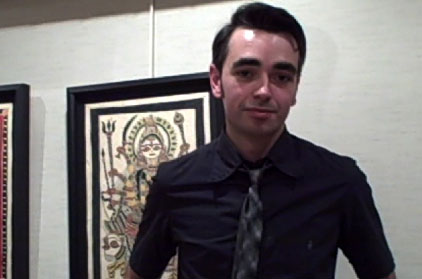Tony O’Neill and the Novel of Existential Drug Addiction

“I’m not AA at all,” Tony O’Neill declared as our interview about his second novel, Down and Out on Murder Mile, got into full swing. “I still get high a lot. I still drink. I just don’t put needles in my arms. I’m as recovered as I want to be.” He isn’t particularly interested in being a spokesperson for the futility of the War on Drugs, but he has a particular loathing for the recovery culture’s insistence on forcing a mindset of weakness on addicts. “That was the thing that kept me going back to heroin when I was in AA,” he explained as we sat in the upstairs café of a downtown Manhattan bookstore. “Having a beer is not a relapse, and I realized that it was becoming a pattern from me when I was in the program; if you tell a junkie he’s relapsed, it gives him the perfect excuse to start doing the drugs he wants to be doing.”
Down and Out on Murder Mile draws freely upon O’Neill’s experiences when he was heavily using crack and heroin. The opening scene, in which the protagonist heads out into the night on Christmas Eve looking for a score, was based on real events, and was originally conceived as a self-contained story that simply kept growing. “Given what my life had been like up to the point when I started writing, it would have been crazy for me to ignore it,” he conceded. “I’ve probably stockpiled material for fifty more books if I didn’t get bored talking about myself… [But] I feel like you have to bring somethng else to the table.” For O’Neill, that means trying to recapture the 1990s Los Angeles drug subculture, a time and place he sees as largely vanished: “The corner where I used to score crack has a multimillion dollar condo on it now.”
Just as his characters do, O’Neill and his then-wife moved to London in 2001 to clean up after hitting bottom in LA. He fell in love and married a non-addict, and returned to New York when their daughter was ten months old—and he was starting to get more serious about getting his work published. “I felt it was a bit more accessible here,” he said, recalling how he used to hang out at the bar where Contemporary Press conducted their editorial meetings, gradually insinuating himself into their circle until he slipped the manuscript for his first novel, Digging the Vein, into their submissions stack. (The new book has been picked up by HarperPerennial.)
Since his novels are so firmly rooted in his personal history, what did he think about authors who elected to write about their addiction as nonfiction? “The whole drug recovery memoir genre is not something I read for fun,” he said, expressing a preference for “the guys who turn it into fiction,” like Alexander Trocchi, Herbert Huncke, and Dan Fante. (He does, however, make an exception for Jerry Stahl’s Permanent Midnight, “the epitome of everything that can be good in that genre.”) “I read A Million Little Pieces,” he continued, “and I was like, come on, is this for real? The book was okay, but what struck me wrong was the way [James Frey] set out to make himself seem macho. You don’t see a lot of macho junkies.” Despite his literary misgivings, though, O’Neill firmly believes “the controversy was pretty much bullshit—it’s the writer’s prerogative to interpret his own story.”
It’s a principle he firmly defends in discussing his own work, which he describes as sharing “an existential view of addiction” with Trocchi. “The drugs are a side issue… to getting through day-to-day existence,” he elaborated, outlining his concerns while writing about how he would wrap up the story. “It was getting dangerously close to a schmaltz ending,” he said. “I didn’t want it to be a book that had definite answers. I didn’t want readers to walk away with a warm glow… I don’t believe there are epiphanies. You just keep on existing.”
(He’s much happier than that sounds, though, honest! And for his next book, he says he’s moving “closer to pure fiction,” though he’ll continue to probe “the city underneath the city” from his memories of Los Angeles as a setting.)
18 November 2008 | interviews |

 Our Endless and Proper Work is my new book with Belt Publishing about starting (and sticking to) a productive writing practice.
Our Endless and Proper Work is my new book with Belt Publishing about starting (and sticking to) a productive writing practice. 
